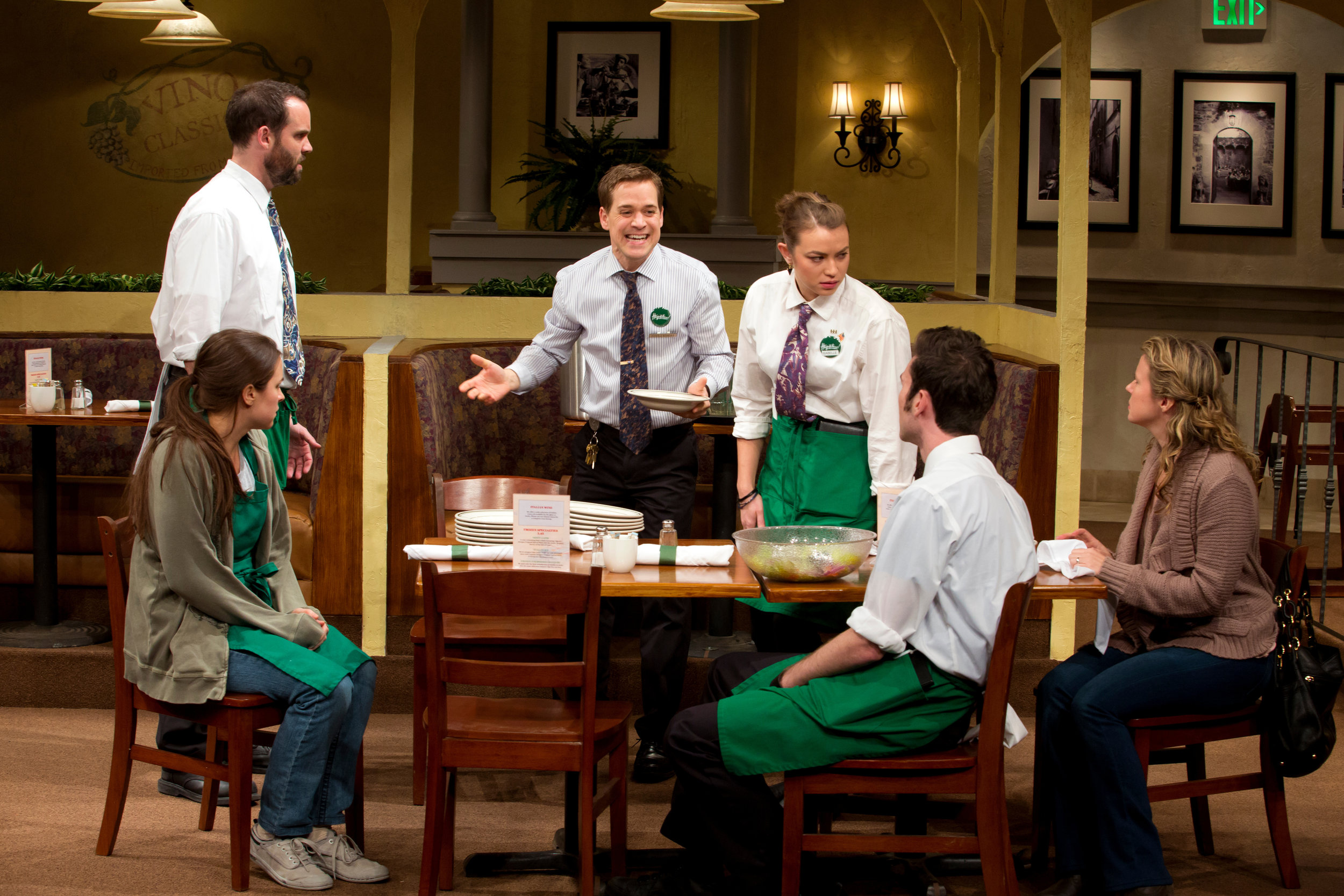
The setting of Samuel D. Hunter’s Pocatello is written as a “nationwide Italian franchise.” Although the restaurant that protagonist Eddie manages isn’t named in the script, the endless soup, salad, and breadsticks give it away: Olive Garden. But in production there is a specificity that is necessary to confirm that assumption. For the world premiere at Playwrights Horizons, Hunter, along with director Davis McCallum, scenic designer Lauren Helpern, and props supervisor Kate Stack crafted a space that felt very much like the Olive Garden that we all know well.
“There are these, what are they, sugar packets? The pink for Sweet’n’Low and so on. Each one has a little Olive Garden label on it,” said Joseph Fernandez, the Production Assistant. “And the team wanted the audience members in that first row to see that kind of detail.”
The props were undoubtedly authentic, as Fernandez continued, “Olive Garden even has breadsticks that you can order to go! So we would order a bunch every three weeks for the shows.”
However, the authenticity didn’t stop there. In the first week of rehearsal, the stage management team reserved an hour for the cast members who played restaurant employees to meet with a then-Olive Garden employee and fellow actor, Nick Flatto, for a brief training.
“There’s a line early in the play during the chaos scene when Max offers Tammy a sample of wine and he says, ‘Anything free is good, right?’ which is a line that Nick said to customers all the time…and Sam [Hunter] loved it so he put it in.” Fernandez said.
Flatto answered questions about his day-to-day experiences at Olive Garden – everything from banter with customers to what he carried on him in his apron when serving tables. “It was mostly about the logistics, whose job it was to do what,” Flatto said. “TR [Knight] would ask ‘Well, would a manager do this or do that’ and my response would be ‘Well how much do you care about your job?’”
Knight’s character, Eddie, certainly cares about his job – perhaps a little too much, considering it’s a restaurant he doesn’t even own. But it’s more than a job or a restaurant; it’s the last glimpse of what he feels to be his. Eddie’s grandfather’s restaurant is long gone and his immediate family is growing further apart. However, given that the chain stores that fill up Pocatello – and so many more small towns every year – are a major cause of the deterioration of the identities that make these towns unique, it’s ironic that it’s this restaurant that is keeping Eddie’s feeling of home together. So why go to the trouble of putting that on stage?
“I was just thinking back to my own experiences and public places from my childhood and a certain Italian food franchise looms large in my memory,” Hunter said in an interview for Playwrights Horizons. “We went to visit my family in Boise…and there was an Olive Garden there. I loved it! When I was a kid I loved the food, the fake Italian-ness of it was a lot of fun. I just remember seeing a lot of family there [and] it was oddly successful in this mission statement of ‘When you’re here, you’re family’… So I wanted to write a play about this chain restaurant that wasn’t ironic.”
The play certainly achieves that goal. Audience members who saw the Playwrights Horizons production raved that the play felt authentic, touching, and real. Hunter’s words provided the landscape, while the production team’s attention to detail brought it to life. And beyond the restaurant, there’s a reason it’s so easy for this play to feel authentic: as real as the breadsticks are the numbers of national chains putting small businesses out of commission; as real as the sugar packets are the people forced to take on jobs like Eddie’s when they can’t support their initial passion. More recognizable than the several household brand names are the desires for a connection to something deeper than brand. Thankfully, Hunter’s play gives you just that.
To purchase a copy of Pocatello, click here, and to learn more about licensing a production, click here.
Header Image: 2014 Playwrights Horizons Production of Pocatello (Jeremy Daniel).

Newly Available for Licensing – January 2026 (UK)

Newly Available for Licensing – January 2026 (US)

